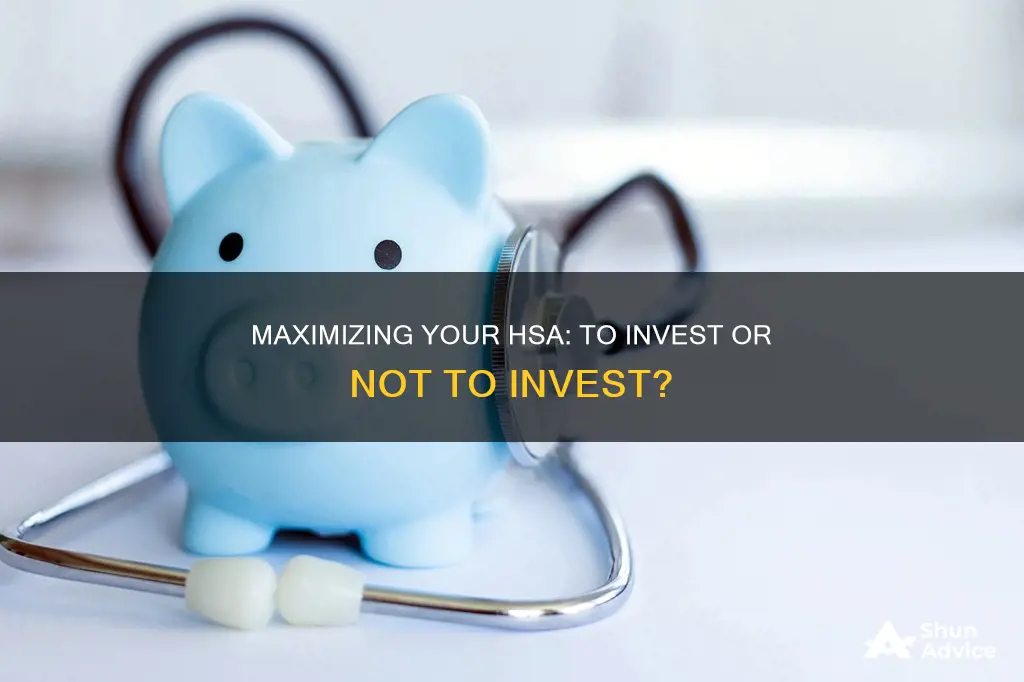
Health savings accounts (HSAs) are a great way to save for future medical expenses and offer triple tax benefits. Contributions are tax-deductible, earnings are tax-free, and withdrawals for qualified medical expenses are also tax-free. While you can keep your HSA funds in cash, investing them can help them grow faster. You can invest in stocks, bonds, mutual funds, ETFs, and more, depending on your HSA provider and your preferences. However, it's important to consider your risk tolerance and future medical needs when deciding how to invest your HSA funds.
| Characteristics | Values |
|---|---|
| Tax advantages | Contributions are tax-deductible, earnings are tax-free, and withdrawals are tax-free when used for qualified medical expenses |
| Tax implications of non-qualified withdrawals | Ordinary income tax plus a 20% early withdrawal penalty for those under 65 |
| Tax implications of non-qualified withdrawals for those over 65 | Ordinary income tax |
| Minimum cash balance before investing | Varies, but typically $1,000-$2,000 |
| Investment options | Stocks, bonds, mutual funds, ETFs, dividend funds, individual stocks, robo-advisors |
| Investment strategies | Long-term growth, pay current expenses, pay future expenses, pay yourself back later |
| Maximum contribution for individuals in 2024 | $4,150 |
| Maximum contribution for families in 2024 | $8,300 |
| Maximum catch-up contribution for those 55 or older | $1,000 |
What You'll Learn

Triple tax benefits
Health Savings Accounts (HSAs) are savings vehicles that offer a triple tax advantage. They are designed to help cover health care costs, which are often a person's largest expense in retirement.
The triple tax benefits of HSAs are as follows:
Tax-Free Contributions:
No taxes are withheld from HSA contributions made through payroll deductions, meaning every dollar contributed goes directly into your account. This allows you to keep more of your paycheck and gives you more money to use on qualified health expenses compared to using funds from other accounts. Contributions are also tax-deductible if made through other means.
Tax-Free Growth:
Any interest or earnings on your HSA account are tax-free. This feature adds more dollars to your account, which can be used for qualified health expenses. This is a compelling reason to utilise the investing feature of your HSA account as part of your long-term financial plan.
Tax-Free Withdrawals:
Unlike other tax-advantaged accounts such as 401(k)s or IRAs, you can make tax-free withdrawals from your HSA to pay for qualified health expenses. This means you won't have to pay taxes on the money when you take it out, as long as it is used for eligible medical costs.
These triple tax benefits make HSAs an attractive option for those seeking to save for future health care costs and reduce their tax liability. However, it's important to note that HSAs are only available to those enrolled in a high-deductible health plan.
A Secure Future: Investing in Provident Funds
You may want to see also

HSA funds for retirement
A health savings account (HSA) is a great tool to help you prepare for future health care costs and can also be used as a long-term investment vehicle to boost your retirement savings. HSAs offer a triple tax advantage, making them an effective savings and investment account:
- Withdrawals for qualified medical expenses are income tax-free.
- All contributions to an HSA are income tax-free.
- Any interest earnings and investment growth from deposits are income tax-free.
You can use your HSA with other retirement accounts to maximize your after-tax retirement income. This allows you to avoid dipping into retirement accounts intended for cost-of-living expenses. HSAs are also a great way to pay for qualified medical expenses in retirement.
Investing HSA dollars has many potential tax benefits and can be an additional way to save for long-term health care expenses and financial goals. You can choose from a variety of investment options, including stocks, bonds, mutual funds, and ETFs.
- Max out contributions by age 65 to save for general retirement expenses beyond medical expenses.
- Don't spend your contributions to take advantage of the triple tax advantages.
- Invest your contributions wisely by considering your portfolio as a whole to ensure proper diversification and risk management.
- Pay health care expenses first, as qualified withdrawals are tax-free.
- Reimbursement yourself for medical expenses at a later date, as there is no time limit on reimbursing yourself for eligible expenses.
- Choose a beneficiary for your HSA funds upon your death, typically your spouse to avoid tax implications.
- Take advantage of the investment opportunity to maximize the benefits of the account.
Index Funds: The Smartest Investment Choice for Your Money
You may want to see also

HSA investment options
A health savings account (HSA) is a great way to save for future healthcare expenses or your retirement. It also offers a triple tax advantage: contributions are tax-deductible, earnings are tax-free, and withdrawals are tax-free when used for qualified medical expenses.
HSA Invest Program
The HSA Invest program offers three investment options—Choice, Select, and Managed—that are aligned with your HSA and financial objectives. You can enrol in more than one option. The Choice option is ideal for experienced investors and offers a simplified brokerage experience with a large range of stocks, mutual funds, exchange-traded funds (ETFs), and more. The Select option provides a recommended list of mutual funds, specific to your unique risk tolerance and investment objectives, selected by an SEC-registered investment advisor (RIA). The Managed option is an even higher level of personalisation, where the SEC-RIA actively manages and rebalances the investments on your behalf. Annual asset-based fees may be applied on a quarterly basis and deducted from the investment balance.
Fidelity
Fidelity offers two options for investing your HSA funds: Fidelity Go® HSA and a self-directed Fidelity HSA®. With Fidelity Go® HSA, a robo-advisor chooses and manages your investments based on your long-term goals and risk tolerance. There is no minimum to open an account; it only requires $10 to start investing. The self-directed Fidelity HSA® option allows you to choose and manage your own investments, which can include stocks (including fractional shares), bonds, ETFs, mutual funds, and more. There are no account fees or minimums for either option.
Charles Schwab
Charles Schwab suggests keeping two to three years' worth of routine medical expenses in cash, cash investments, or similar low-volatility investments within your HSA. Any excess funds could be invested for potential growth. They recommend investing based on your risk tolerance, time horizon, and a diversified portfolio or other investment choices offered by your HSA administrator.
Other Options
Some other HSA providers include Lively, Optum, Further, and Health Equity. These providers may have higher fees and different investment options, so be sure to research and compare before choosing a provider.
Strategies for Investing in Sovereign Wealth Funds
You may want to see also

HSA vs IRA/401k
Investing your HSA funds is a great way to save for retirement, but how does it compare to IRA/401k?
An HSA, or Health Savings Account, is a tax-advantaged account that individuals can use to pay for healthcare expenses, save for the future, and invest to build their savings. HSAs are portable, meaning that you can take the account with you if you change employers, and into retirement, where funds may be used for non-medical expenses. HSAs are also distinguished by their triple tax advantage: contributions are tax-deductible, earnings are tax-free, and withdrawals are tax-free when used for qualified medical expenses.
A 401(k), on the other hand, is a common type of employer-sponsored retirement plan. You elect to defer a portion of each paycheck, and your employer transfers these funds automatically into your 401(k). In some cases, your company may even match your contributions. Both 401(k)s and HSAs offer valuable tax advantages, but 401(k)s are specifically designed for retirement savings, whereas HSAs are intended for medical savings.
An IRA, or Individual Retirement Account, is a long-term savings account that can be used to save for the future and qualifies for certain tax advantages. Like HSAs, you can choose to invest in a wide range of financial products, including stocks, bonds, and mutual funds, to further grow your account. An IRA is primarily designed for self-employed individuals who do not have access to other retirement savings options through an employer.
So, which is the best option? The answer depends on your individual circumstances and goals. If you are looking for a way to save for retirement and take advantage of tax benefits, all three accounts are viable options. If you anticipate having high healthcare costs in retirement, an HSA could be a good choice as it allows you to save for medical expenses and take advantage of tax-free withdrawals for eligible medical expenses. If you are self-employed and do not have access to an employer-sponsored retirement plan, an IRA may be a better option. Ultimately, it is important to consider your financial goals and needs when deciding which account is right for you.
A Guide to Investing in CPSE ETF Funds
You may want to see also

HSA minimums for investing
When it comes to investing your HSA funds, there are a few things to keep in mind. Firstly, it's important to note that not all HSA providers allow investments, and some may require a minimum balance before you can start investing. This minimum balance requirement can typically range from $500 to $1,000, but can go as high as $3,000. However, there are providers like Fidelity that offer self-directed HSAs with no minimum balance requirement, allowing you to start investing as soon as you have money in your account.
When choosing an HSA provider, it's essential to consider the fees, investment options, minimum balance requirements, and interest rates offered. Some providers may charge monthly maintenance fees, account opening or closing fees, investment fees, paper statement fees, and other transaction-related charges. It's also worth noting that some providers may waive certain fees if your account balance meets a certain threshold.
In terms of investment options, HSA providers may offer a variety of choices such as stocks, bonds, mutual funds, exchange-traded funds (ETFs), dividend-paying stocks, individual stocks, short-term bond funds, and more. It's important to evaluate these options based on your risk tolerance, investment goals, and time horizon.
Additionally, it's crucial to understand the tax implications of investing your HSA funds. HSAs offer a triple tax advantage, which means that contributions are tax-deductible, earnings on the account remain tax-free as long as they are used for qualified medical expenses, and withdrawals for qualified expenses are also tax-free. However, if you withdraw HSA funds for non-qualified expenses before the age of 65, you may be subject to taxes and penalties.
By considering the minimum balance requirements, fees, investment options, and tax advantages offered by different HSA providers, you can make an informed decision about investing your HSA funds in a way that aligns with your financial goals and risk tolerance.
International Equity Mutual Funds: Diversify and Grow Your Wealth
You may want to see also
Frequently asked questions
HSAs have a triple tax advantage. Contributions are tax-deductible, earnings are tax-free, and withdrawals are tax-free when used for qualified medical expenses.
If you have a lower risk tolerance or think you might need money for future medical expenses, it’s best to focus on investments with less risk, such as short-term bond funds or money market funds. If you don’t expect much in the way of medical expenses in the coming years, stocks are likely to be one of the best ways to invest and grow your HSA. Some options include index funds, dividend funds, and individual stocks.
Once you reach age 65, money in your HSA can be withdrawn and used for any reason. If it’s used for non-qualified expenses, you’ll be subject to ordinary income taxes on the withdrawal. Withdrawals for non-qualified expenses prior to age 65 come with a 20% penalty and are taxed as ordinary income.
It is recommended that you keep two to three years' worth of routine medical expenses in cash or similar low-volatility investments within your HSA. Any excess funds could be invested for potential growth.







